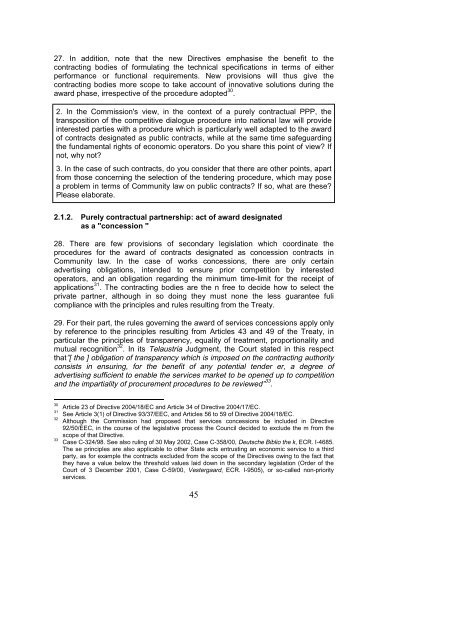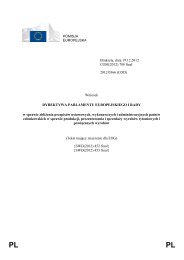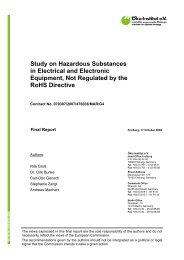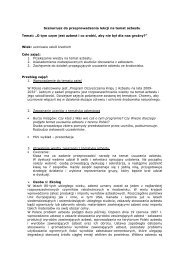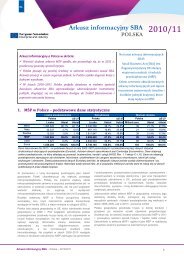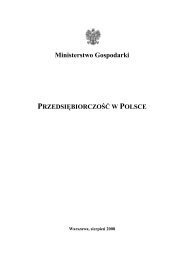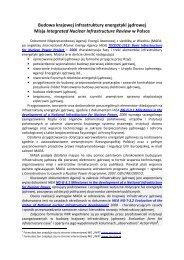Zielona księga w sprawie partnerstw publiczno-prywatnych i prawa ...
Zielona księga w sprawie partnerstw publiczno-prywatnych i prawa ...
Zielona księga w sprawie partnerstw publiczno-prywatnych i prawa ...
You also want an ePaper? Increase the reach of your titles
YUMPU automatically turns print PDFs into web optimized ePapers that Google loves.
27. In addition, note that the new Directives emphasise the benefit to the<br />
contracting bodies of formulating the technical specifications in terms of either<br />
performance or functional requirements. New provisions will thus give the<br />
contracting bodies more scope to take account of innovative solutions during the<br />
award phase, irrespective of the procedure adopted 30 .<br />
2. In the Commission's view, in the context of a purely contractual PPP, the<br />
transposition of the competitive dialogue procedure into national law will provide<br />
interested parties with a procedure which is particularly well adapted to the award<br />
of contracts designated as public contracts, while at the same time safeguarding<br />
the fundamental rights of economic operators. Do you share this point of view? If<br />
not, why not?<br />
3. In the case of such contracts, do you consider that there are other points, apart<br />
from those concerning the selection of the tendering procedure, which may pose<br />
a problem in terms of Community law on public contracts? If so, what are these?<br />
Please elaborate.<br />
2.1.2. Purely contractual partnership: act of award designated<br />
as a "concession "<br />
28. There are few provisions of secondary legislation which coordinate the<br />
procedures for the award of contracts designated as concession contracts in<br />
Community law. In the case of works concessions, there are only certain<br />
advertising obligations, intended to ensure prior competition by interested<br />
operators, and an obligation regarding the minimum time-limit for the receipt of<br />
applications 31 . The contracting bodies are the n free to decide how to select the<br />
private partner, although in so doing they must none the less guarantee fuli<br />
compliance with the principles and rules resulting from the Treaty.<br />
29. For their part, the rules governing the award of services concessions apply only<br />
by reference to the principles resulting from Articles 43 and 49 of the Treaty, in<br />
particular the principles of transparency, equality of treatment, proportionality and<br />
mutual recognition 32 . In its Telaustria Judgment, the Court stated in this respect<br />
that”[ the ] obligation of transparency which is imposed on the contracting authority<br />
consists in ensuring, for the benefit of any potential tender er, a degree of<br />
advertising sufficient to enable the services market to be opened up to competition<br />
and the impartiality of procurement procedures to be reviewed” 33 .<br />
30 Article 23 of Directive 2004/18/EC and Article 34 of Directive 2004/17/EC.<br />
31 See Article 3(1) of Directive 93/37/EEC, and Articles 56 to 59 of Directive 2004/18/EC.<br />
32 Although the Commission had proposed that services concessions be included in Directive<br />
92/50/EEC, in the course of the legislative process the Council decided to exclude the m from the<br />
scope of that Directive.<br />
33 Case C-324/98. See also ruling of 30 May 2002, Case C-358/00, Deutsche Biblio the k, ECR. I-4685.<br />
The se principles are also applicable to other State acts entrusting an economic service to a third<br />
party, as for example the contracts excluded from the scope of the Directives owing to the fact that<br />
they have a value below the threshold values laid down in the secondary legislation (Order of the<br />
Court of 3 December 2001, Case C-59/00, Vestergaard, ECR. I-9505), or so-called non-priority<br />
services.<br />
45


